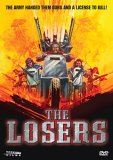| Reviews & Columns |
|
Reviews DVD TV on DVD Blu-ray 4K UHD International DVDs In Theaters Reviews by Studio Video Games Features Collector Series DVDs Easter Egg Database Interviews DVD Talk Radio Feature Articles Columns Anime Talk DVD Savant Horror DVDs The M.O.D. Squad Art House HD Talk Silent DVD
|
DVD Talk Forum |
|
|
| Resources |
|
DVD Price Search Customer Service #'s RCE Info Links |
|
Columns
|
|
|
Losers, The
The story is simple: Major Thomas (Dan Kemp) persuades biker brother Link (William Smith) and his gang to fly into Vietnam for a dangerous mission into Cambodia. Link and his gang - Limpy (Paul Koslo), Duke (Adam Roarke), Dirty Denny (Houston Savage), and Speed (Eugene Cornelius) - agree to ride customized Yamahas to Dang huk, some two miles behind enemy lines, to rescue CIA operative Chet Davis (Jack Starrett). The steel-plated choppers the gang welds together recall later post-apocalyptic films The Road Warrior but also the improvised armor plating soldiers are using now in Iraq.
Several members of the gang had been busted out of the armed forces and are anxious to return to Vietnam. Duke reunites with his Vietnamese lover, Suriya (Lillian Margarejo), while Denny returns to the rowdy brothel he once ran with a disreputable Mama-san (Paraluman). At the brothel, Limpy falls in love with Kim Sue (Ana Corita) and bonds with her illegitimate daughter, whose father was a black American soldier that had abandoned them both.
About the only well-known Hollywood movie about Vietnam actually made during the war was The Green Berets (1968), John Wayne's laughable anticommunist extravaganza, which unconvincingly recreated Vietnam on the grounds of Fort Benning in Georgia. The Losers, conversely, was shot entirely in the Philippines, and while the terrain doesn't exactly match that of Vietnam it's a good approximation, with the Vietnamese, Cambodian, and Chinese roles played by Filipinos. (A few are recognizable professionals, such as Black Mama White Mama's Vic Diaz.) One poor village appears minimally dressed to appear Vietnamese, and some of the action was improvised with non-professional onlookers, including a nice bit where Link gives a ride to a (genuinely) hunchbacked little boy.
It would be quite interesting indeed to know how returning vets responded to the film - Oliver Stone probably loved it - it almost certainly resonated better than any fiction film until the late-'70s postwar boom in Vietnam-themed screenplays (Coming Home, The Deer Hunter, etc.). Unlike the Wayne picture, The Losers dramatizes the war in chaotic, bloody terms, with Vietnamese children working with the guerillas to kill American soldiers and American soldiers shooting small children in the confusion. The film opens with a bloodbath perhaps inspired by the My Lai Massacre and stylistically modeled after Sam Peckinpah's recent The Wild Bunch (1969), with slow-motion shots of bodies being ripped apart and dropping ignominiously into the muck. That kind of thing has since become a cliche, but in 1970 was still quite shocking.
That the film acknowledges American mistreatment of the indigenous people - the abandonment of children they fathered, the racism, the drug use, the whoring - is also a surprise. The Oscar-winning documentary Hearts and Minds shocked audiences with its scenes of casual violence and soldiers screwing local hookers on-camera but The Losers, for all its exploitation aims, came four years before. The script was written by British character actor Alan Caillou, whose grasp of the dire state of things perhaps stemmed from his own experiences as an intelligence officer in Africa during World War II.
Limpy and Duke's relationships with Vietnamese women isn't especially realistic, partly because the script wrongly assumes that, as in The Green Berets, Vietnamese families would welcome their would-be American saviors with open arms, but the actors' sincere performances - both the Americans and the Filipinos - make it believable.
Video & Audio
The Losers is presented in a sharp 16:9 transfer at 1.77:1 that approximates its original 1.85:1 release. The film elements are free of damage and the color is quite good; the film uses "The Losers" title with all the other credits black-on-white coming at the very end. The transfer is decent but flawed with some digital artifacting quite noticeable when there's a big explosion or jungle foliage rustles in the background. The mono sound is acceptable, and good optional English subtitles are included.
Extra Features
The primary supplement is an Audio Commentary with Stars William Smith and Paul Koslo. Smith now talks like Lawrence Tierney, but both he and Koslo speak fondly of the film, and the very enjoyable track is one of those that play like a casual get-together, with old pals reminiscing while watching the film over a beer. A Still Gallery and a Trailer (along with a dog-eared one for Werewolves on Wheels) are included.
Parting Thoughts
The Losers is one of those movies serious film critics wouldn't have given the time of day just a few years ago, but are now rediscovering and enthusiastically reassessing. It falls far short of greatness, but its ambitiousness and flashes of intelligence raise it well above the average biker movie.
Stuart Galbraith IV is a Kyoto-based film historian whose work includes The Emperor and the Wolf - The Lives and Films of Akira Kurosawa and Toshiro Mifune and Taschen's forthcoming Cinema Nippon. Visit Stuart's Cine Blogarama here.
|
| Popular Reviews |
| Sponsored Links |
|
|
| Sponsored Links |
|
|
| Release List | Reviews | Shop | Newsletter | Forum | DVD Giveaways | Blu-Ray | Advertise |
|
Copyright 2024 DVDTalk.com All Rights Reserved. Legal Info, Privacy Policy, Terms of Use,
Manage Preferences,
Your Privacy Choices | |||||||












